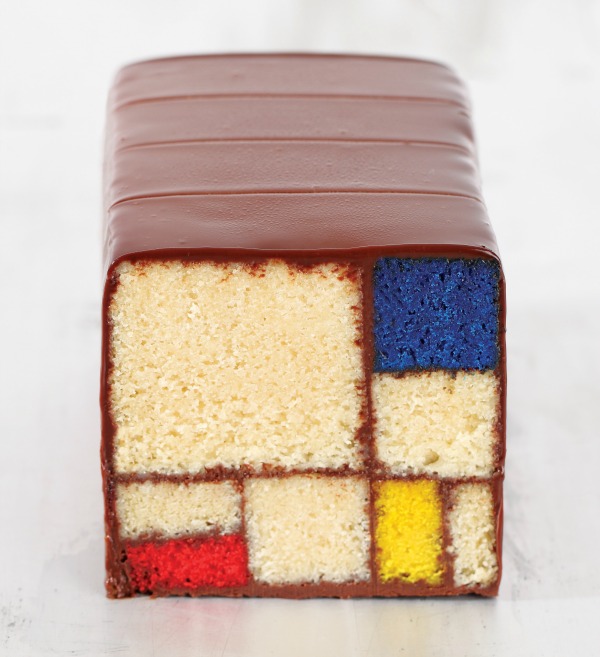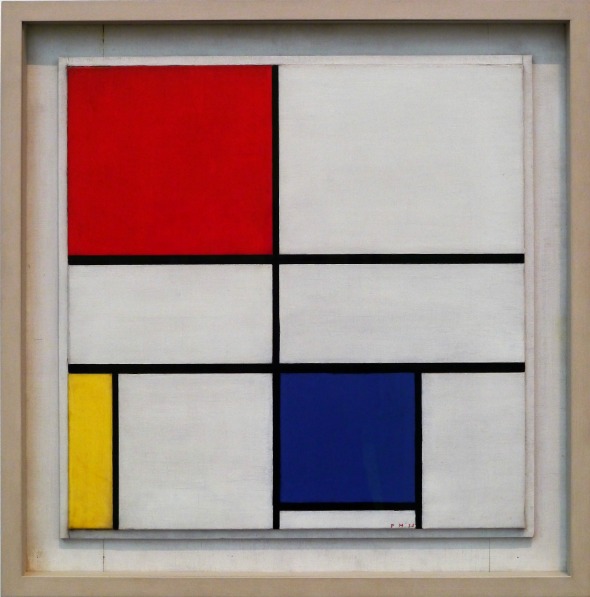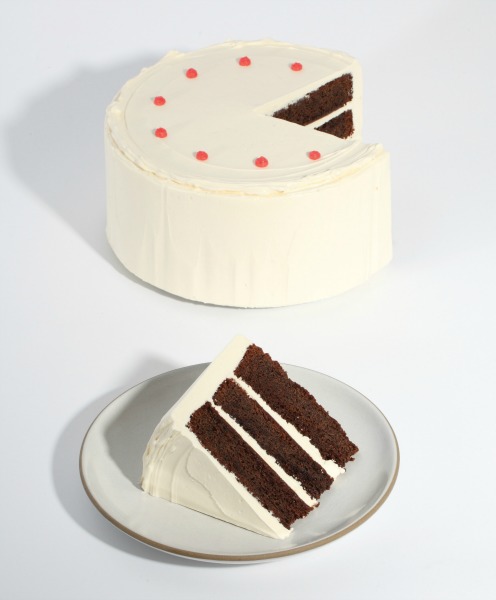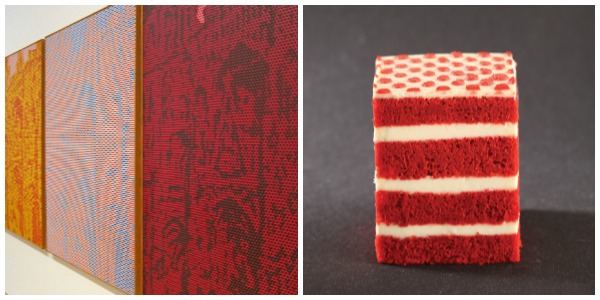What Modern Art Looks Like As Yummy Dessert
Pastry chef Caitlin Freeman uses inspiration from modern art to whip up cakes, cookies and other desserts
![]()

From start to finish, pastry chef Caitlin Freeman’s Mondrian cake, inspired by modernist painting, takes two days to complete. Photo by Clay MacLachlan/Modern Art Desserts: Recipes for Cakes, Cookies, Confections, and Frozen Treats Based on Iconic Works of Art © 2013 Mondrian/Holttzman Trust
Artist Piet Mondrian used oil on canvas to create his famous geometric composition of neat red, yellow and blue squares and straight black lines.
Caitlin Freeman’s interpretation of this work of art is slightly different, and sweeter. Her medium? Flour, sugar, eggs and vanilla extract in a baking pan.
The pastry chef pulls inspiration from art and whips it into cakes, cookies, gelées and parfaits at her café on the fifth floor of the San Francisco Museum of Modern Art. The Mondrian cake, a compilation of moist yellow cake cubes coated in chocolate ganache, is the best seller at the museum location of the Blue Bottle Coffee Bar, which she runs with her husband, James.
In the café’s four years of operation, Freeman and her team have created nearly 100 desserts inspired by artwork that has appeared, at one time or another, on the museum’s walls. Twenty-seven of them, gleaned from works by Andy Warhol, Frida Kahlo and Henri Matisse, are featured in her new cookbook, Modern Art Desserts: Recipes for Cakes, Cookies, Confections, and Frozen Treats Based on Iconic Works of Art, published this week. Each recipe is accompanied by a photo of the original artwork, with detailed history written by Janet Bishop, the museum’s painting and sculpture curator.

Piet Mondrian’s Composition (No. III), the inspiration for Freeman’s best-selling cake. Photo courtesy of Flickr user Groume. © 2013 Mondrian/Holttzman Trust
Freeman includes a photo of her very first attempt at a Mondrian cake, which she says is quite embarrassing to look back on. “It wasn’t perfect, but we just had to make a few thousand of them to feel like we had a hang of what we were doing with that cake,” Freeman says. “You don’t know until you do that final cut whether or not it’s all come together, so that one’s a tricky one.”
Crafting art-inspired cakes wasn’t always the plan for Freeman. She studied photography at the University of California, Santa Cruz, but figured she’d eventually become a dentist—a career goal she explains was likely thwarted by her big sweet tooth. During a trip to the San Francisco Museum of Modern Art, Freeman fell in love with frequent pastry-painter Wayne Thiebaud’s Display Cakes, a 1963 oil painting of a trio of ready-to-eat cakes. Determined to become a pastry chef, she joined a new, small bakery called Miette, learning on the job and graduating from dishwasher to cake decorator (and business partner). She left Miette after seven years. Shortly after, the modern art museum called her and her husband about Blue Bottle Coffee setting up shop in its new rooftop garden.

Freeman’s identical, real-life representation of Wayne Thiebaud’s Chocolate Cake, a 1971 single-color lithograph printed in brown ink. Photo by Clay MacLachlan/Modern Art Desserts: Recipes for Cakes, Cookies, Confections, and Frozen Treats Based on Iconic Works of Art
“My reaction, since I was young, going into art galleries was seeing a piece of art that I really like, and liking it so much that I want to steal it or eat it,” Freeman jokes. “This is my way of doing something about it—just liking something so much that it inspires you to do something.”
How does Freeman move art from the canvas to the cake pan? Countless walk-throughs in the museum’s collections and multiple brainstorming sessions with her team. Some pieces lend themselves immediately to their dessert doppelgangers. For example, artist Ellsworth Kelly’s Stele I, a one-inch-thick, 18-foot-tall rust-colored oblong steel plate looks like an over-sized fudge popsicle.
But sometimes, Freeman says, the inspiration just doesn’t come. Landscape art, in the style of Ansel Adams and Georgia O’Keeffe, was tough to delineate in dessert form, so Freeman told her baristas to do the best they could with leaf-like latte art.

Roy Lichtenstein’s Rouen Cathedral Set V (left), and Freeman’s layered red velvet-and-cream-cheese cake. Photos courtesy of Flickr user Jeffrey Chiang and Clay MacLachlan/Modern Art Desserts: Recipes for Cakes, Cookies, Confections, and Frozen Treats Based on Iconic Works of Art
The colors in a given work of art usually drive the flavors in the resulting dessert. “If it’s all filled with blues and greens, it’s really hard to come up with something that’s tasty that’s blue,” Freeman says. A Ronald Fischer photograph of a shirtless beekeeper covered in bees led to a white chocolate box with a honey-pistachio parfait filling. The deep reds in Roy Lichtenstein’s triptych painting of a French cathedral became a spongy red velvet cake. Andy Warhol’s famous brightly colored print of Elizabeth Taylor gave rise to a neatly stacked gelatin treat of red, pink and mint squares.
Many of the cookbook’s desserts take several hours or even a day to complete, which can seem daunting to the average at-home baker. Freeman lays out a step-by-step assembly guide, instructing readers on how to temper chocolate, master butter cream and use chocolate transfer sheets, which add elaborate, stencil-like designs to finished sweets. “I didn’t want there to be big barriers of entry,” she says.
Frankly, when it comes to dessert, I think most people would agree.
/https://tf-cmsv2-smithsonianmag-media.s3.amazonaws.com/accounts/headshot/marina-koren-240.jpg)
/https://tf-cmsv2-smithsonianmag-media.s3.amazonaws.com/accounts/headshot/marina-koren-240.jpg)